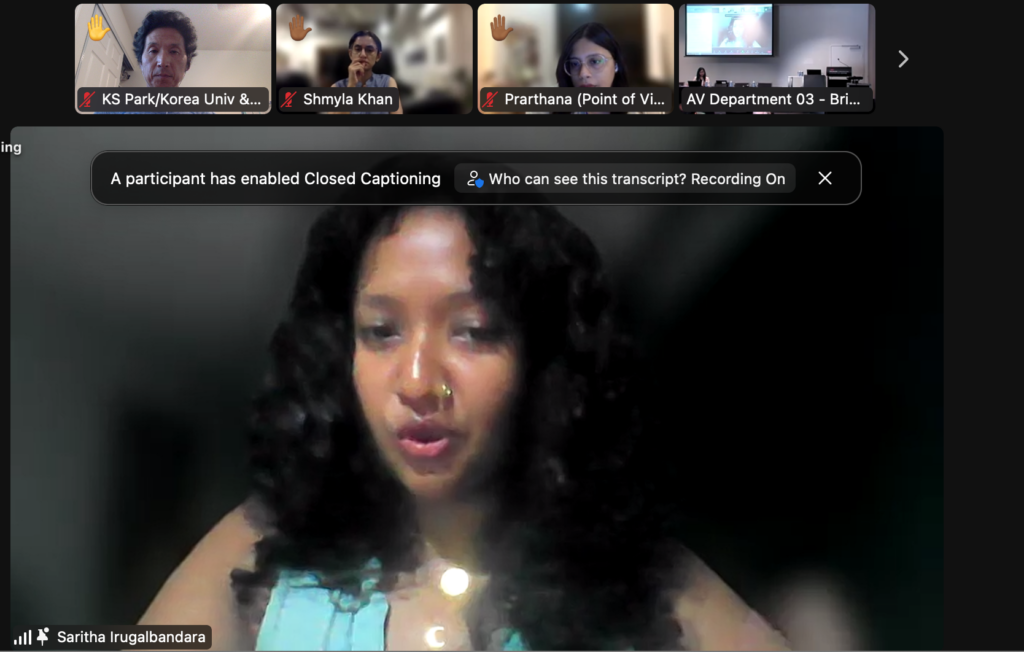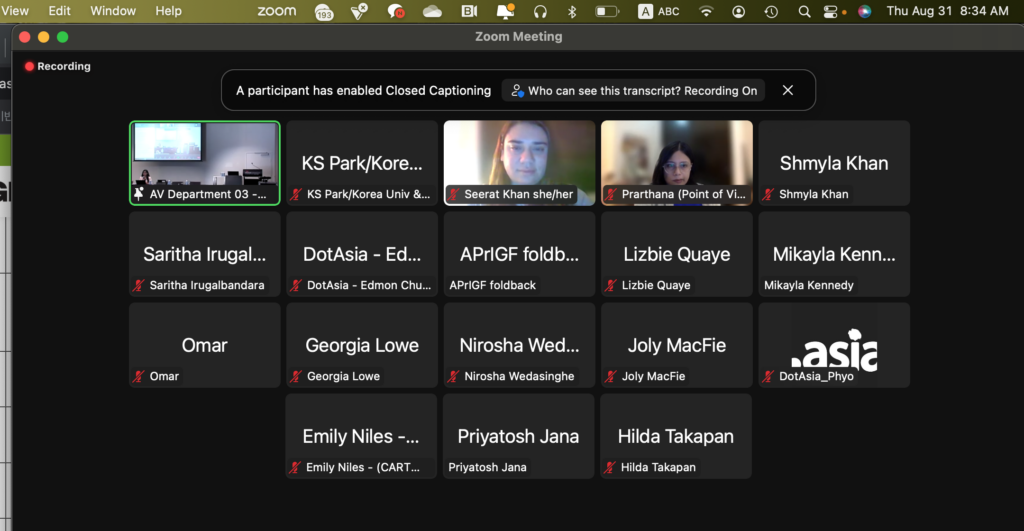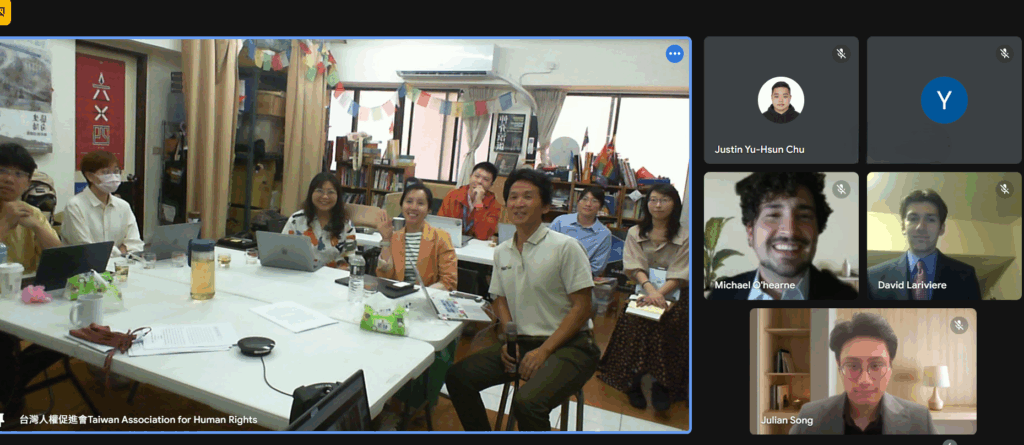Open Net co-moderated an APrIGF session titled Malicious Convergences: Addressing Emerging Trends of Gendered Hate Speech in South Asia.
Date: August 31, 2023
Moderator: Rumky Farhana | Article 19
Panelist:
– Saritha Irugalbandara | Hashtag Generation
– Shmyla Khan | Digital Rights Foundation Pakistan
– Seerat Khan | Digital Rights Foundation Pakistan
– Prarthana Mitra | Point of View India


Providing insights into the state of online harassment, disinformation, and legislative responses in South Asian countries, highlighting the unique challenges and trends within each nation was the purpose of the session.
The case of Sri Lanka focused on the rise of organized online harassment and gender disinformation in Sri Lanka. This issue has gained prominence in recent years, becoming a significant threat to gender equality and the safety of individuals online. The introduction of new legislation, such as the cybersecurity bill, has further exacerbated these issues by granting sweeping powers to authorities. While the bill is ostensibly aimed at improving security, it also raises fears of increased state surveillance and potential misuse against activists and minority groups.
The situation in India is equally alarming, particularly concerning gender and online violence. The coordinated trolling of women and sexual minorities is a significant issue, often resulting in severe psychological and social consequences for the victims. In India, legislative challenges add another layer of complexity. The ongoing debate over the criminalization of marital rape and the fight for marriage equality is emblematic of broader societal struggles with gender justice. Moreover, the weaponization of fake news and online smear campaigns has become increasingly prevalent.
The presentation on Pakistan shed light on the multiple layers of challenges faced by the country in the digital realm. Internet shutdowns, a common tactic employed by the government, disrupt access to information and hinder free expression. Data privacy issues further compound these problems, with citizens’ information often vulnerable to misuse. Gendered hate speech is another pervasive issue, forcing many women and minorities into self-censorship to avoid harassment. Shmyla also highlighted the backlash against the Transgender Persons Protection Act of 2018, which faced significant opposition in 2022 through a targeted smear campaign, revealing deep-rooted prejudices in society.
Prarthana provided an overview of the situation in Bangladesh, where legal frameworks to protect individuals from online harassment exist but are poorly implemented. Prarthana also emphasized the need for capacity building and the development of gender-inclusive policies that address the unique challenges faced by women and minorities in the digital space.
Here are the highlights:
“This session unpacks emerging patterns of gendered hate speech in Sri Lanka, Pakistan, and India and their connections to rapidly expanding phenomena of the global manosphere and far-right, gender-critical sentiment threatening the exclusion of LGBTIQ+ people and the freedom of expression of women and gender-diverse people. Using an evidence-based approach, speakers consider the implications of unhelpful siloing of gendered harm from broader ‘political’ internet governance issues such as disinformation despite the convergence of mis/disinformation and gendered hate speech, particularly in light of emerging technologies such as generative AI and ‘deepfakes’ that are becoming increasingly more accessible and prevalent in perpetrating gendered harm.”
“A key intervention would also be to consider how these gaps are reproduced in policies and regulations formulated by technology companies, particularly with regards to tech design (algorithmic recommendations), content moderation, and their engagements with other stakeholders in the internet governance space.”
“what should be the next stage of collective action and responsibility within the region must be in light of these common, boundary-defying threats to diversity and inclusion on the digital space?”
K.S. Park intervened as follows: Gendered hate speech attempts to disenfranchise women online and often uses disinformation against them. “Unsiloing” of moderation categories is important. Siloed, postings are checked against disinformation and against hate speech separately, and under stringent international human rights requirements, if the posting does not check out on all elements of either category. There is no action. But this compartmentalization is what governments do, which end up leaving much harmful speech in tact. Platforms do not have to emulate governments and can be more pragmatic. If we adhere to 100% harms based principle, we can do a much better job of striking on the intersection of disinformation and hate speech.
Recently, Internews issued a report that trusted flaggers program of META is broken and non-responsive. One of the reasons of non-responsiveness is the platform’s failure to recognize convergence of disinformation and gendered hate speech (= meaning that the platform sees postings either as hate speech or as gendered harm and ends up finding no reason for takedown when a holistic “harm-based” approach would have tilted it the other way. Especially, with generative AI and deepfakes, sexual disinformation become easy tools of gendered hate speech. Platforms must be more accountable in unsiloing the categories and trying to address the problem of gendered harm more squarely if platforms want to enjoy their role as a democratizing space.
Kyoungmi Oh intervened as follows: I can talk about two cases of convergence of gendered hate speech and disinformation in Korea. First, there were unconfirmed rumors that the current first lady Gunhee Kim was a high-class call girl called Julie servicing male politicians. Amid the presidential election 2022, an artist opposed to her husband Seok-yul Yoon, the president now, drew a mural featuring her and several men under a subtitle “Julie’s Men”. It was to criticize her for not qualifying as first lady based on her sexual purity. Second, several cases of ideological validation of female game illustrators. If a female game illustrator expresses her interest on feminism, for instance by sharing feminism books or T-shirts with feminist messages, south Korean male gamers often stigmatize her as a feminist and push the company to fire her. South Korea is seriously a male centric society. Women are always devalued with disinformation based on the sexuality or sexual purity and gender ideology.
However, one way to solve the problem of convergence is to diffuse the myth of sexual purity, which is applied only against women. In Korea, there are attempts to do that. Some civil society organizations argue that the society should approach to women’s desire to have safe sex as a human right, including the right to take comprehensive sex education, the right to access proper health care for sexually transmitted infection, and the right to choose to continue or terminate pregnancy.
In 2020, there were several incidents where teenage girls were blackmailed and sexually exploited by men after sharing content expressing their sexual curiosity and desire on the internet. Amidst the obvious condemnation of the men who committed the crimes, the critiques also pointed to the lack of safe spaces for teenage girls to express their sexual needs and curiosity due to the prejudice that “female adolescents should be sexually naive”. What is diabolical, teenage girls were easily blackmailed into further sexual exploitation exactly because of the stigma attached to ‘unpure girls’. These viewpoints meaningfully challenged the patriarchal society penalizing the victims of sexually assault and established the right to aspire to sexual desires as a victim of violence.
I absolutely agree with the idea on the role of media houses in Perspectives on Gendered Disinformation. In Korean society, there is also a strong criticism of media coverage that emphasizes only the sensationalized parts of events in order to get more exposure on the internet and therefore more advertising revenue. The fact-checking role of the media and increasing the number of female editors is absolutely necessary. Equally, platforms are also responsible for fact-checking upon filing of complaints and also increasing the number of female moderators.
14 ppl attended off-line (6 male, 8 female) and 18 ppl online.


0 Comments